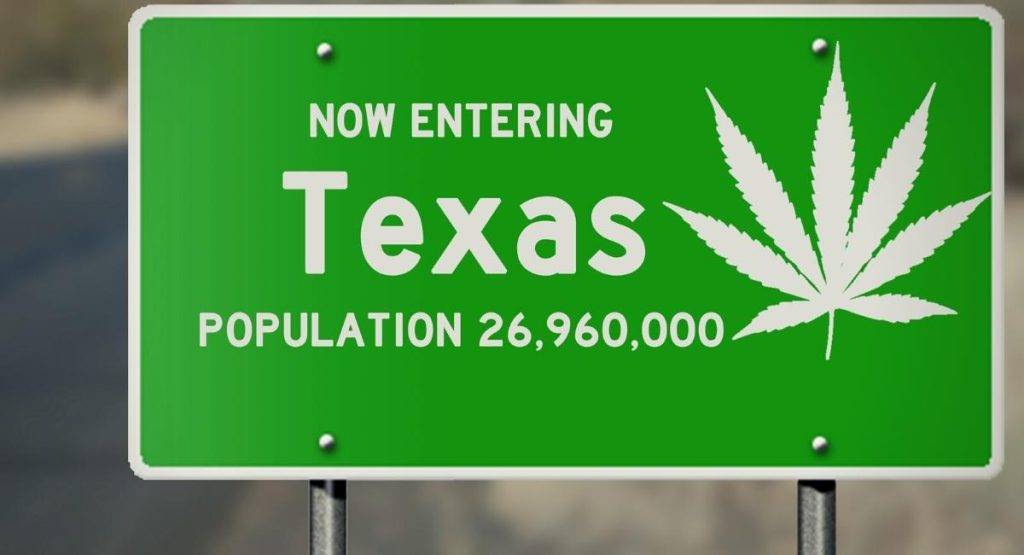On May 1, 2023, the Houston Chronicle reported that the Texas House of Representatives passed a bill to effectively decriminalize marijuana in the state. The bill was approved after a second reading by members of the House through a voice vote, leaving another vote in the chamber before final passage, and is now awaiting consideration by the Texas Senate.
The House vote on House Bill 218 (HB 218) came after the House Jurisprudence committee approved it through a unanimous bipartisan vote two months ago. The 87-59 vote by the House of Representatives followed preliminary approval of the bill from the chamber one day before.
HB 218 is authored by Democratic Representative Joe Moody and would make possession of as much as one ounce of marijuana a Class C misdemeanor offense, removing the possibility of jail time and instead imposing a fine of up to $500. Existing law currently classifies possession of small amounts of cannabis as a Class B misdemeanor and involves penalties of up to 180 days in jail and up to a $2,000 fine.
“Possessing a small amount of cannabis is still illegal. We’re just addressing it in a smarter way than we do now,” Moody said. “What this will do is free up hundreds of millions of dollars that currently go into enforcement, keep police on the street working more serious cases instead of processing these petty arrests and make sure those who would currently end up with a record that interferes with jobs, school, housing and licensure come out of the process without any permanent stigma.”
The legislation would also reduce the penalties for certain other marijuana crimes, reducing possession of one to two ounces of marijuana to a Class B misdemeanor offense that would not be subject to arrest. Possession of between two to four ounces of marijuana would also be reduced to a Class A misdemeanor.
The bill further specifies that possession of as much as two ounces of marijuana would not result in an arrest, meaning alleged offenders would only be cited and released. People who have possession convictions for up to two ounces of marijuana could also seek to have convictions expunged through a court process for $30.
The Texas House of Representatives passed similar proposals to decriminalize marijuana during both the 2019 and 2021 legislative sessions, although both ended up dying in the Texas Senate. HB 218 uses elements of both of Texas’ most recent attempts at marijuana decriminalization in one bill.
Opposition from Lieutenant Governor Dan Patrick, who presides over the chamber, has led to previous attempts stalling in the Senate, but it remained unclear whether Patrick would again try to block the reform legislation. The website Marijuana Moment attempted to contact the lieutenant governor’s office for comment, but his representatives did not respond in time for publication.
House lawmakers were also being expected to consider another broader recreational marijuana legalization bill from Moody that includes a hearing by the Licensing and Administrative Procedures Committee. House Bill 3652 (HB 3652) would allow the use, possession and transportation of up to 2.5 ounces of cannabis by adults 21 years of age and older, allow people to grow up to 12 cannabis plants at home, and contain provisions to expunge convictions for past lower-level marijuana offenses.
The measure would also legalize commercial production and sale of marijuana products, that would be taxed at a rate of 10 percent. The plan would be for the Texas Department of Licensing and Regulation to oversee regulating recreational marijuana and licensing adult-use cannabis businesses.
Additional legislation from Democratic state Representative Jessica González, House Bill 1937 (HB 1937), would allow county and municipal governments to legalize recreational marijuana at a local level. The measure would also direct the Texas Commission of Licensing and Regulation to adopt any necessary rules for administration and enforcement of the bill, including licensing, regulation, testing standards, and transportation.
Marijuana Defense in Dallas, TX
If you are facing any kind of marijuana charges in Texas, you will want to be sure that you retain legal counsel as soon as possible. As it currently stands, Texas imposes harsh penalties for marijuana possession, and people can face the following charges:
- 2 ounces or less — Class B misdemeanor punishable by up to 180 days in jail and/or a fine of up to $2,000
- More than two ounces, but less than four ounces — Class A misdemeanor punishable by up to one year in jail and/or a fine of up to $4,000
- More than four ounces, but less than five pounds — State jail felony punishable by up to two years in state jail and/or a fine of up to $10,000
- More than five pounds, but less than 50 pounds — Third-degree felony punishable by up to 10 years in prison and/or a fine of up to $10,000
- More than 50 pounds, but less than 2,000 pounds — Second-degree felony punishable by up to 10 years in prison and/or a fine of up to $10,000
- More than 2,000 pounds — Life felony punishable by imprisonment in the Texas Department of Criminal Justice for life or for a term of not more than 99 years or less than 5 years, and a fine not to exceed $50,000
The penalties above relate to possession of marijuana. There are situations in which people can face even more serious criminal charges.
For example, Texas Health and Safety Code § 481.120 establishes that a person commits a delivery of marijuana offense if they knowingly or intentionally deliver marijuana. These offenses are classified as follows:
- One-fourth ounce or less without remuneration — Class B misdemeanor punishable by up to 180 days in jail and/or a fine of up to $2,000
- One-fourth ounce or less with remuneration — Class A misdemeanor punishable by up to one year in jail and/or a fine of up to $4,000
- More than one-fourth ounce, but less than five pounds — State jail felony punishable by up to two years in state jail and/or a fine of up to $10,000
- More than five pounds, but less than 50 pounds — Third-degree felony punishable by up to 10 years in prison and/or a fine of up to $10,000
- More than 50 pounds, but less than 2,000 pounds — Second-degree felony punishable by up to 10 years in prison and/or a fine of up to $10,000
- More than 2,000 pounds — Life felony punishable by imprisonment in the Texas Department of Criminal Justice for life or for a term of not more than 99 years or less than 5 years, and a fine not to exceed $100,000
Texas does not have a state law relating to marijuana cultivation, so people who grow their own marijuana are usually charged with either or possibly both possession and delivery offenses. In instances of alleged marijuana trafficking, there is also the possibility of federal charges.
Simple possession of marijuana under 21 U.S.C. § 844 establishes that 100 kilograms or more of marijuana (or 100 or more plants) can lead to a five year mandatory minimum and up to 40 years prison sentence. In cases involving 1,000 kilograms or more of marijuana (or 1,000 or more plants), a person could be facing a 10 year mandatory minimum and up to life in prison sentence.
Eligible Texans have access to medical marijuana through the State’s compassionate use program (CUP) administered by the Texas Department of Public Safety (DPS). The Compassionate Use Registry of Texas (CURT) is the system that allows physicians to register and prescribe low-THC cannabis to patients with certain medical conditions, and after prescribed, dispensing organizations can search for the patient in the system and dispense the medication according to the prescription.
The Compassionate Use Program is statutorily limited to patients in Texas with amyotrophic lateral sclerosis (als), autism, cancer, epilepsy, incurable neurodegenerative disease, multiple sclerosis, post-traumatic stress disorder, seizure disorder, spasticity, or medical conditions designated by the Health and Human Services Commission as authorizing treatment with low-THC cannabis as part of an approved research program. Texas Occupations Code § 169.001 defines low-THC cannabis as the plant Cannabis sativa L., and any part of that plant or any compound, manufacture, salt, derivative, mixture, preparation, resin, or oil of that plant that contains not more than 1.0 percent by weight of tetrahydrocannabinols.
The Law Offices of Richard C. McConathy understands the most effective ways to fight all kinds of marijuana charges, and we will work to make sure that you are able to achieve the most favorable outcome to your criminal case that results in the fewest possible penalties. We can review your case and answer all of your legal questions as soon as you call (972) 233-5700 or contact us online to set up a free consultation.





